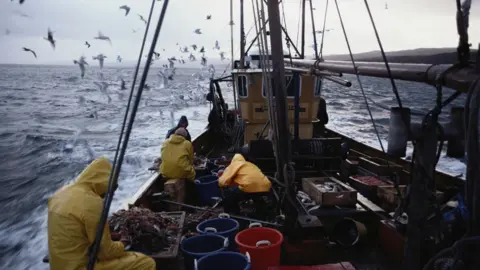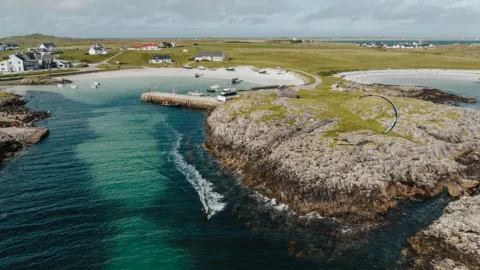Scottish government scraps marine conservation plan
 Getty Images
Getty ImagesThe Scottish government has scrapped its plans to create Highly Protected Marine Areas in 10% of Scotland's seas.
The proposals would have restricted fishing and other human activities in some coastal areas, in a bid to protect the environment.
But members of the fishing industry and some island communities raised concerns about the plans.
Net Zero Secretary Mairi McAllan said the government was firmly committed to enhancing marine protection.
But she said the current plans would not be progressed.
Instead, the Scottish government will consult further with the industry, communities and conservation organisations about a new pathway and timetable.
However, groups that wish to pursue community-led marine protection in their local area on a quicker timescale, such as those initiatives in Lamlash Bay on Arran, will be supported to pursue their plans
Members of the Scottish fishing industry, coastal communities and even some MSPs had raised fierce objections to the marine conservation proposals.
The Scottish Fishermen's Federation (SFF), which represents the country's fishermen's associations, has warned the plans could have a "catastrophic impact" on the industry.
 Getty Images
Getty ImagesFormer Finance Secretary Kate Forbes warned people, not wildlife, could become the "endangered species" in Highland and island areas due to jobs being lost as a result of the proposals.
Those sentiments were captured in a popular song by Celtic music band Skippinish, whose The Clearances Again track warned that the "the soul will be torn" from island communities, with the protected areas representing "a wrecking ball through our existence".
Ms McAllan said: "We chose to consult as early and widely as possible on the principles of Highly Protected Marine Areas (HPMAs), with no pre-determined sites.
"It has always been, and continues to be, this government's plan to work co-operatively with communities to identify how and where to enhance marine protection in a way that minimises impact and maximises opportunity.
"Therefore, while we remain firmly committed to the outcome of enhanced marine protection, the proposal as consulted on will not be progressed."
As part of the Bute House Agreement - which brought the Scottish Greens into government in a historic power-sharing deal with the SNP - ministers had planned to designate at least 10% of Scotland's seas as HPMAs by 2026.
It meant that all forms of fishing including recreational catch and release angling would be prohibited in selected sites.
Seaweed harvesting would also be banned, no new marine renewable energy schemes would be allowed and the laying of subsea cables would be restricted.
Managed levels of swimming, snorkelling and windsurfing would be allowed.
'Rigid and damaging'
About 37% of Scotland's seas are already included in Scotland's Marine Protected Areas network.
These areas are managed for the long-term conservation of marine resources, ecosystems services, or cultural heritage.
Scottish Conservative rural affairs spokeswoman Rachael Hamilton said: "The SNP might have rebranded their reckless plans on Highly Protected Marine Areas, but in reality this amounts to little more than kicking the can down the road.
"Never have I experienced a policy that has received such overwhelming opposition from coastal communities, and Scotland's fishermen must now be at the heart of any proposals brought forward.
"SNP-Green ministers have caused huge stress in recent months in our coastal communities - and that must never happen again."
 Getty Images
Getty ImagesScottish Labour's rural affairs spokeswoman Rhoda Grant said: "The SNP/Green government plans for HPMAs would have had a catastrophic impact on our rural and island communities, and it is right that they have signalled an end to this chaos.
"We hope the Scottish government will now go back to the drawing board, work collegiately with coastal communities on effecting plans to protect our seas."
Scottish Liberal Democrat rural affairs spokeswoman Beatrice Wishart said Ms McAllan's announcement was "testament to the power and voice of rural and remote communities who were united in their opposition".
Greens coastal communities spokesperson Ariane Burgess welcomed the announcement and accused opposition parties of trying to "weaponise the nature emergency".
Elspeth Macdonald, chief executive of the Scottish Fishermen's Federation, welcomed the move to scrap the "flawed" HPMAs.
She said: "Ministers will now need to re-assure people that they are not simply intent on introducing the same policy by the back door."
A spokesman for the charity Open Seas said: "Although Open Seas support the stated aims of HPMAs, we have maintained serious concerns about the approach taken so far to implement them.
"The Scottish government are now learning a hard lesson that deep community engagement and participation is fundamental to taking action for the environment."
He added: "The HPMA debate has diverted some attention from the routine environmental damage to Scotland's coastal seabed caused by scallop dredging and bottom-trawling.
"Scottish ministers must prioritise action on these most destructive fishing methods to secure real sustainability for our seas and fisheries."


This is the latest in a series of difficult or controversial policies which Humza Yousaf inherited from Nicola Sturgeon which have been watered down or jettisoned entirely.
It is probably not a coincidence that the move was announced on the very last day of term, while many eyes were on Ms Sturgeon's appearance at the Covid inquiry.
But it is also striking that it has been welcomed across the political spectrum at Holyrood, despite other parties having a very broad range of views on the topic.
SNP backbenchers found themselves singing from the same hymn sheet as the Conservatives in decrying the impact on coastal communities and businesses.
Labour were ultimately fairly typical in being a party which backed the principle of marine protection, but couldn't stomach the specifics of the proposals.
Even the Greens - who wrote HPMAs into their Bute House Agreement with the SNP - have rowed in behind the idea of a new timeframe.
It's one less headache for the government to ponder as MSPs head off for the summer recess.
But with a promise of a rethink, it won't be long before there is pressure come up with a fresh way forward.
